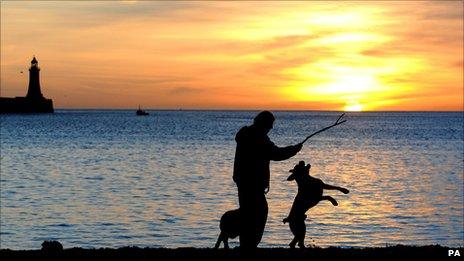A question of time: changing the clocks
- Published

Several attempts have been made at Westminster to change daylight hours
The Policy Studies Institute has released a report arguing that Scotland would benefit from a switch to Single/Double Summer Time (SDST).
Such a move would bring the country into line with much of continental Europe, where winter is one hour ahead of Greenwich Mean Time (GMT) and summer time two hours ahead of GMT.
As we wait for the clocks to go back an hour this weekend, it seems a good time to take a look at past efforts to effect change - and where the arguments stand today.
There have been frequent unsuccessful attempts in the UK parliament over the past few decades to make changes to the current system.
Older readers may remember the three-year experiment launched in 1968, when British Standard Time (GMT+1) was employed all year round.
The clocks were put forward as usual in March 1968 and not put back until October 1971.
The Department for Transport's initial analysis of road casualty data during the experiment suggested more people were injured in the darker mornings, but fewer people were injured in the lighter afternoons.
It estimated a net reduction of 2,700 people killed or seriously injured during the first two years of the experiment.
However, it was recognised at the time that the calculations did not take into account drink-driving legislation passed in 1967, so the Department for Transport eventually re-analysed the data and factored that in. In 1989, it found the data agreed broadly with the earlier estimates.
It suggested that those living in central England and southern Scotland benefited most from the experiment. However, northern Scotland saw a net increase in the number of people killed or seriously injured.
Experiment dropped
A White Paper published in 1970 said it was impossible to quantify the advantages and disadvantages of British Standard Time.
The experiment was debated in the Commons on 2 December 1970 and - by a vote of 366 to 81 - the experiment was discontinued.
Since then, a number of MPs have tried - and failed - to change the clocks through private members' bills, with much of the resistance coming from north of the border.
Conservative MP Rebecca Harris, whose constituency is in Essex, recently tabled a private members' bill seeking to establish British Summer Time in the winter. Her argument is that it would give us daylight when we could use it most.
But Labour MSP James Kelly reacted to the news by arguing it would "plunge" Scotland into darkness.
He said: "It would cause grave concerns if we're trying to get more young people to walk to school. If it's going to be dark until 10 o'clock in many places in Scotland, then that wouldn't be achieved. And it would seriously undermine the safety of individuals."
'Pressing concern'
The Scottish government has also opposed any switch on similar grounds, as have the Scottish Conservatives who say road safety would be "a hugely pressing concern".
Scottish Secretary Michael Moore has also poured cold water on the PSI report, claiming that the majority of business and industry leaders in Scotland are against a shift to Central European Time.
Farmers in Scotland, however, seem more open to the idea of change than politicians north of the border.
Scott Walker, policy director at NFU Scotland, said his union did not believe that sufficient justification had yet been given to change current arrangements but left the gate open for further analysis.
He added: "The country experimented with a change in the clocks in 1968-71, but the information generated then and its relevance in 2010 would be questionable."
But he went on to say that NFU Scotland did support Rebecca Harris's bill which would propose in-depth analysis of the impact of any change before any permanent change to the clocks was proposed or adopted.
He added: "The impact of any change to daylight saving time will not be uniform across the UK, so we need to analyse the particular Scottish impacts of such a change and the success of the planned private member's bill may provide that platform."
At 0200 BST on 31 October, the UK will move to 0100 GMT
- Published29 October 2010
- Published29 October 2010
- Published21 June 2010